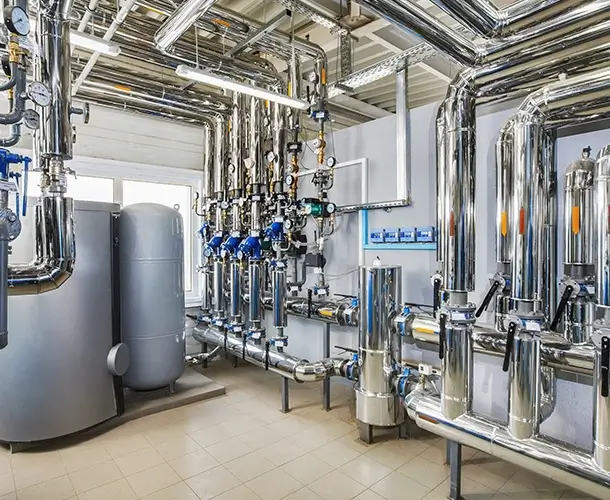Boiler Installation, Repair & Service
Professional Boiler Services in Orange County
Boilers powered the SS United States when she crossed the Atlantic in three days, 12 hours, and 12 minutes.
They heated the homes of America through much of the 20th century (and still do in many cases).
In Orange County today, you’ll find them in commercial buildings, industrial facilities, hospitals, restaurants, older homes, and high-end homes with radiant hydronic in-floor heating.
Boilers are simple and reliable, but like all other appliances, they need maintenance and occasional repair. Every 15 to 20 years, they should be replaced.
Orange Coast Plumbing maintains and repairs all boilers and can install a new energy-efficient boiler to replace the aging unit in your building.
What’s a Boiler, Exactly?
A boiler is a system that heats water to a high temperature, sometimes to the boiling point (steam), then circulates it through pipes to radiators or other heating fixtures in a building.
Boilers can also complement other heating systems like furnaces or heat pumps. They’re common in colder climates where central heating is essential for comfort and in commercial buildings with high heat or hot water demands.
They offer several advantages, including efficiency, reliability, and longevity — plus the ability to heat potable water.
Boilers vs. Water Heaters: What’s the Difference?
Boiler
- Used to power a building’s central heating system. Circulates hot water through pipes to radiators, underfloor heating systems, or baseboard heaters.
- Doubles as a high-temperature water heater in the range of 140°F to 220°F.
- Is more energy-efficient than a water heater, but also more expensive to purchase and install.
- Usually installed away from living areas — i.e., in a basement, utility room, or garage.
Water Heater
- Provides hot water for washing, bathing, and cleaning.
- Less energy-efficient than boilers, but cheaper to purchase and install.
- Typically heats water to temperatures around 120°F (the safe point before the risk of scalding).
- Can be installed directly at the point of use (e.g., under the sink) or centrally to supply hot water to multiple points in a building.

Signs Your Boiler Needs Maintenance or Repair
These are some of the telltale signs your boiler needs professional attention:
- Lack of heat: Inadequate heat or hot water could be due to a malfunctioning boiler (heating element), a blocked heat exchanger, pump or circulation problems, or thermostat issues.
- Strange noises: Whistling, banging, gurgling, and squealing all point to different problems within the boiler.
- Leaks: Deteriorated gaskets, damaged valves, water pressure problems, and corrosion are the usual suspects for leakage.
- Too much heat: A broken thermostat or pump could prevent your boiler from cycling off.
- Strange smells: A burning odor can indicate an electrical malfunction, a clogged burner, or a fuel leak. A rotten egg smell may be due to natural gas — a safety concern because gas is flammable and toxic.
- Increased energy bills: A malfunctioning component or a loss of pressure will reduce boiler efficiency and drive up energy use.
- Intermittent heating: If your boiler heats up and cools down repeatedly, the thermostat, circulation pump, or other system components may be at fault.
- Malfunctioning thermostat: A damaged or miscalibrated thermostat won’t read temperatures correctly and can cause temperature fluctuations.
- Loss of boiler pressure: This could be due to leaks, air in the system, a faulty expansion vessel, or a malfunctioning pressure-reducing valve.
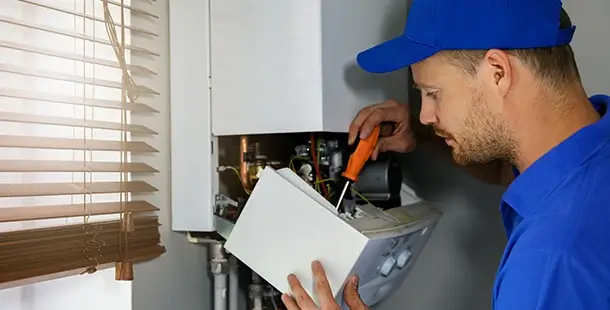
Can Boilers Explode?
Yes, poorly maintained or malfunctioning boilers can explode if enough pressure builds up.
A lack of water in the system, a faulty pressure release valve, or a blocked pipe can create conditions for rupture.
Regular maintenance is critical. An experienced technician can diagnose potential issues and keep your boiler running safely and efficiently.
Repair vs. Replacement: When Should You Install a New Boiler?
An older or troublesome boiler may not be worth the cost of repair. The best boilers today are up to 98 percent efficient. Replacing an old boiler with one of these Energy Star-rated models could save you money in the long run.
Our technicians will inspect your boiler, identify any problems, and provide a range of repair or replacement options that make sense for your home or business.
Factors include:
- Age: If the boiler is over 15 years old and has a history of breakdowns, it may be time to replace it.
- Cost of repairs: If the repair bill is close to the cost of a new boiler, a new, fully warranted boiler is your best option.
- Energy efficiency: New boilers are more energy-efficient than older models, and the savings from lower energy bills can offset the price tag of a new boiler over time.
- Availability of parts: If parts are scarce or the manufacturer has stopped producing them, a new boiler is your only option.
- Performance: If your old boiler isn’t meeting hot water and steam demands, consider an upgrade.
Ultimately, the decision to repair or replace a boiler should be based on a cost-benefit analysis, considering the age, cost of repairs, energy efficiency, availability of parts, and performance of the old boiler.
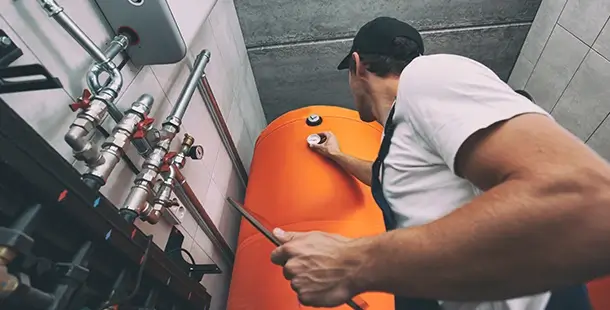
Who Uses Boilers Today?
Boilers are common in hospitals, hotels, schools, restaurants, apartment complexes, government buildings, and other large-scale facilities where there’s a need for a high-volume, constant, and reliable source of hot water or steam.
They’re used in industrial processes, such as in power plants for generating electricity and in food processing for sterilization and pasteurization.
Increasingly, boilers are installed in single-family homes with hydronic radiant heating.
Boiler Installation for Hydronic Radiant Heating Systems
Radiant heating warms people and objects directly via infrared radiation, like the sun.
It feels more natural than forced air, especially in large open spaces. Radiant systems are highly efficient and invisible if installed under floors, making them a favorite with designers for upscale homes and commercial spaces.
Hydronic radiant heating passes hot water through a system of tubes or pipes, either in the floor or ceiling. A boiler generates and maintains the hot water temperature.
Orange Coast Plumbing can install a state-of-the-art boiler in your home to power your hydronic radiant heating system. We’ll work with you to choose the best model based on climate, fuel availability, and your budget. Contact us today for more information!
Orange Coast Plumbing, Your Raypak Boiler Experts
Raypak, owned by Rheem, is the boiler brand we trust most for our customers.
Raypak boilers are exceptional in their efficiency, safety, and durability. We’ve worked with them often over the years and recommend them to all our customers. We’ll help you pick the right model for your business, home, pool, or spa.
Of course, if your heart’s set on another brand or if you’ve already ordered a boiler, we’ll install that for you instead.
All Orange Coast plumbers and heating and cooling technicians are licensed, certified, insured, and trained in the latest techniques and technologies.
All estimates are free.
Does your boiler need service, or are you curious about what a boiler can do for your home or business? We answer the phones 24-7.
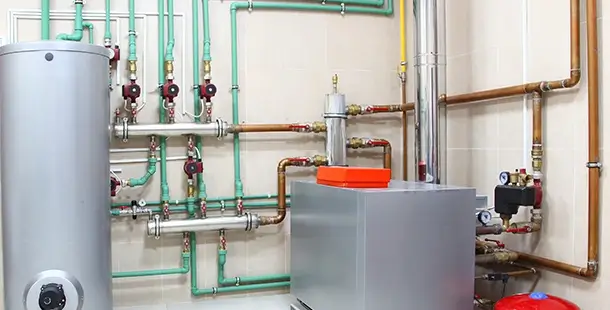
Frequently Asked Questions about Boiler Installation & Repair
What are the different types of boilers for heating?
- Combi Boilers: These are compact and efficient, providing both hot water and central heating in one unit.
- System Boilers: System boilers provide central heating and hot water without the need for a separate hot water cylinder.
- Conventional Boilers: Conventional boilers, also known as regular or heat-only boilers, are separate components for heating and hot water.
- Condensing Boilers: Condensing boilers are highly efficient boilers that use waste heat to preheat the water before it enters the heating system.
- Electric Boilers: Electric boilers use electricity to heat water, making them ideal for homes without a gas supply.
- Biomass Boilers: Biomass boilers use organic materials, such as wood pellets, chips, or logs, to generate heat and hot water.
Can I install a boiler myself, or do I need a professional?
Installing a boiler demands a high level of technical knowledge, experience, and understanding of gas and electrical systems. Improper installation can result in gas leaks, fires, and carbon monoxide poisoning.
By law, all gas boiler installations, repairs, and maintenance must be performed by a gas safe registered professional. This is to ensure that the installation meets gas and electrical safety standards.
How often should I schedule maintenance for my boiler?
We recommend annual maintenance. The technician will check the boiler for any problems, clean it, and make any necessary repairs or adjustments.
Scheduling regular maintenance can extend your boiler’s lifespan and prevent unexpected breakdowns.
Also, have your boiler serviced immediately if you notice any warning signs of a problem such as unusual noises, decreased efficiency, or leaks.
Can I still use my boiler if it's leaking water?
Leaks can be a sign of a serious problem. Plus, a leak near electrical components could create a dangerous situation.
Never use a leaking boiler. Have it fixed or replaced by a professional.
What are the usual causes of boiler breakdowns?
Common causes of boiler breakdowns include:
- Lack of maintenance and annual servicing
- Scale build-up inside the boiler
- Corroded or damaged components
- Low water pressure
- Broken or malfunctioning thermostat
- Faulty gas valve
- Airlocks or trapped air in the system
- Clogged or blocked filters
- Leaks in the system
- Electrical component failure
What is kettling?
Kettling describes a phenomenon that occurs when mineral deposits build up in the boiler’s heat exchanger. The deposits disturb water flow and create a vibration that sounds like a loud rumble or “kettle” noise.
Kettling can overwork the heat exchanger, decreasing efficiency and leading to component failure. To prevent kettling, have the boiler cleaned and serviced regularly by a qualified technician and use water treatment products to reduce mineral buildup.
How can I prevent my boiler from breaking down?
- Schedule annual maintenance with a qualified technician.
- Keep the boiler clean and free of debris.
- Check the pressure regularly and keep it within the recommended range.
- Replace air and fuel filters regularly.
- Insulate pipes to prevent condensation and corrosion.
- Bleed radiators regularly to remove air from the system.
- Make sure that the thermostat is functioning properly and set to the correct temperature.
- Check for leaks and have them repaired promptly.
- Keep the area around the boiler clean and clear of obstructions.
- Monitor the boiler’s performance and report any unusual noises or changes to a technician.
For more information or to schedule an appointment, please call us today.
OCP Is Here to Help
Our technicians have updated knowledge and technical expertise to deal with any boiler emergency, swiftly and efficiently.
With our fully equipped fleet of vehicles, we stay ready 24/7 to help you with boiler emergencies and ensure that you stay comfortable and warm throughout the season.

No need to worry if your boiler is not working.
Just call us and get prompt boiler service at your doorstep!
